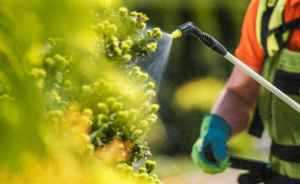Monsanto Roundup® Lawsuit
The popular weed killer Roundup®’s active ingredient, glyphosate, has been categorized as a probable carcinogen and linked to non-Hodgkin’s lymphoma and other cancers. Courts across the country have awarded billions of dollars to victims. See if a top Roundup lawyer may be able to help you file a Roundup lawsuit and get the compensation and justice you deserve.
Why Take Legal Action?
By filing a product liability lawsuit, you can pursue financial compensation and justice from the companies that caused you or a loved one harm.
Results Secured
- $40 million for a veteran exposed to asbestos from Goodyear gaskets
- $1.16 million for a Roundup® victim in New York
- $575,000 for a man in Florida who suffered chemical burns from Just for Men® hair dye
Roundup Lawsuit Update 2025
Since the first Roundup lawsuit was tried in 2018, thousands of victims have taken legal action against both Monsanto, the weed killer’s manufacturer, and its parent company Bayer.
The plaintiffs in these lawsuits claim that exposure to Roundup caused them to develop non-Hodgkin’s lymphoma or other blood cancers. They allege that the defendants failed to warn them of the dangers associated with this herbicide.
Multiple cases have resulted in big wins for Roundup victims over the past year, including two verdicts that topped $2 billion.
Latest Developments on the Monsanto Roundup Lawsuit
- Over 4,400 Roundup cancer lawsuits are pending in federal court.
- U.S. juries have awarded more than $6 billion to Roundup victims since June 2025.
- Bayer is attempting to convince Congress to pass a bill that would protect the company from lawsuits claiming glyphosate in Roundup causes cancer.
Families across the country are finally having their voices heard and getting the compensation and justice they deserve.
If you or a loved one developed non-Hodgkin’s lymphoma from Roundup exposure, you may be entitled to compensation. Get started with a free case review.
Can I File a Roundup Cancer Lawsuit?
You may be able to file a Roundup and cancer lawsuit if you or a loved one:
- Used or was exposed to Roundup
- Was later diagnosed with non-Hodgkin’s lymphoma or another Roundup cancer
If you lost a loved one to a Roundup cancer, you may be able to file a wrongful death lawsuit on their behalf.
Not sure if you qualify? Contact one of our case managers at (888) 726-9160 right now to find out.
What Cancers Qualify for a Roundup Lawsuit?
While most Roundup lawsuits link the weed killer to non-Hodgkin’s lymphoma, some claim that the product causes other types of cancer.
Roundup-related cancers include:
- B-cell lymphoma
- Burkitt lymphoma
- Chronic lymphocytic leukemia
- Follicular lymphoma
- Hairy cell leukemia
- Lymphoblastic lymphoma
- Mantle cell lymphoma
- Marginal zone lymphoma
- Non-Hodgkin’s lymphoma
- Small lymphocytic lymphoma
- T-cell leukemia
- T-cell lymphoma
If you were exposed to Roundup and later diagnosed with one of these cancers, you may be able to file a lawsuit for compensation that can help pay for your medical expenses, pain and suffering, and more.
Roundup Lawsuit Deadline
As more cases of Roundup cancer are diagnosed, those affected continue to take legal action by filing Roundup lawsuits, but victims only have a limited amount of time to pursue justice.
Like all product liability lawsuits, there’s a deadline to file a Roundup cancer lawsuit. This time limit, known as the statute of limitations, varies by state.
The best way to ensure that you meet this deadline is to contact a personal injury lawyer as soon as possible after you’ve been diagnosed with a Roundup-related cancer or after the death of a loved one.
The lawyers in our network have recovered billions of dollars for people harmed by Roundup and other dangerous products.
Get a free case review to see if you can work with an experienced Roundup lawyer who may be able to pursue compensation on your behalf.
Steps to File a Roundup Weed Killer Lawsuit
A Roundup lawsuit can be complex, but working with a skilled attorney may improve your chance of a successful outcome.
Roundup lawyers are knowledgeable about this case type and how to maximize compensation for clients. Additionally, they handle all aspects of a Roundup claim, so victims can focus on their health and families during this challenging time.
Find out more about the process of filing a Roundup cancer lawsuit below.
1. Get a Free Case Review
Top Roundup lawyers offer free case reviews, so victims can see if they may be able to file a lawsuit and seek compensation without any financial risk.
This initial consultation lets potential clients get a feel for the attorney’s style and decide if they’re the right fit.
2. Collect Evidence
Your Roundup lawyer and their team of medical experts and legal researchers will gather evidence to link your cancer to the weed killer.
Roundup exposure evidence may include:
- Medical records documenting your cancer diagnosis
- Receipts showing you purchased Roundup
- Testimony from people who saw you use Roundup
- Work records, if you applied the weed killer as part of your job
3. File Your Roundup Claim
Your attorney will file your lawsuit with the appropriate court system before the statute of limitations. They will keep you updated as your case moves forward.
4. Fight for Compensation
The goal of a Roundup cancer lawsuit is to get victims maximum compensation as quickly as possible. Your legal team will try to negotiate with the defendant to get you the compensation you deserve through a Roundup lawsuit settlement.
Most Roundup lawsuits are resolved through settlements without the victim ever having to step foot inside a courtroom.
However, if a settlement can’t be reached, your team will be ready to fight for you in court and pursue a Roundup verdict.
Roundup Class Action Lawsuits vs Individual Lawsuits
Roundup lawsuits have been filed as both individual personal injury lawsuits and mass torts known as multidistrict litigation (MDL).
A Roundup MDL is similar to a Roundup class action lawsuit. In both an MDL and a class action, the courts combine many cases with the same defendant to streamline the litigation. However, in an MDL, each plaintiff presents their own case.
As of June 2025, at least 4,424 Roundup product liability claims are pending in an MDL in the Northern District of California.
In 2025, the majority of Roundup lawsuits are being filed as individual actions in state courts.
An experienced Roundup personal injury lawyer can help you figure out the route that makes the most sense for your family if you have a case.
Roundup Lawsuit Settlement and Verdict Amounts
In 2020, Monsanto’s successor, Bayer AG, settled most of the Roundup claims that had been filed against it for $10.9 billion.
However, additional cases continue to be filed and tried in courts nationwide. Juries have awarded some victims millions — and even billions — of dollars through verdict awards.
Notable Roundup lawsuit settlements and verdicts include:
- $2.25 billion to a Pennsylvania man with non-Hodgkin’s lymphoma
- $2.1 billion from a Georgia jury to a man diagnosed with non-Hodgkin’s lymphoma
- $1.56 billion to three patients with non-Hodgkin’s lymphoma
- $332 million for a California man diagnosed with non-Hodgkin’s lymphoma
- $289 million to a former school groundskeeper with non-Hodgkin’s lymphoma
- $175 million for an 83-year-old Philadelphia man with non-Hodgkin’s lymphoma
- $1.6 million on behalf of a family with a child diagnosed with lymphoma
In many of these cases, juries have tacked on sizeable punitive damage awards to punish the manufacturer for its conduct in placing a dangerous product on the market.
A Roundup lymphoma lawsuit is a way for victims to seek compensation for their injuries and hold negligent manufacturers accountable.
See if a Roundup lawyer in our network can pursue compensation and justice on your behalf.
What Is Roundup?
Roundup is an herbicide (weed killer) that was originally manufactured by Monsanto but was later acquired by Bayer. It works by blocking enzymes that control plant growth.


The active ingredient in Roundup is glyphosate, the most widely used agricultural chemical in history. This is almost entirely due to Roundup, which was developed in the 1970s.
The U.S. Environmental Protection Agency (EPA) maintains that glyphosate exposure doesn’t lead to an increased risk of cancer. However, public health agencies around the world believe the chemical poses a danger to human health.
In 2015, the International Agency for Research on Cancer (IARC) labeled glyphosate as a likely carcinogen. In 2019, citing the IARC study, France banned Roundup and glyphosate entirely.
Monsanto has claimed in advertising that Roundup was biodegradable, as safe as table salt, and only harmful to plants. All of these claims were found to be false, and the company had to withdraw the ads and pay steep fines for lying to the public.
In January 2023, Bayer voluntarily removed glyphosate from all residential products in the United States. However, the chemical is still available and widely used in the U.S. commercially and agriculturally.
Over the years, Monsanto (and later Bayer) has settled thousands of lawsuits in the U.S. and Europe over Roundup and claims about its safety.
The Link Between Roundup & Non-Hodgkin’s Lymphoma
Several studies have linked the main ingredient in Roundup to non-Hodgkin’s lymphoma, as well as other types of cancer.
For example, a 2019 study by researchers at the University of Washington found that exposure to glyphosate may increase the risk of non-Hodgkin’s lymphoma by 41%.
Other studies have found a possible connection between glyphosate and other types of cancer, including chronic lymphocytic leukemia (CLL), acute myeloid leukemia, and diffuse large B-cell lymphoma.
Groups at Risk for Roundup Cancer
Those exposed to Monsanto’s Roundup in large amounts are most at risk for non-Hodgkin’s lymphoma and other Roundup cancers.
This includes workers who have likely come in contact with high levels of glyphosate for an extended period of time due to their jobs.
High-risk groups for Roundup-related cancers include:
- Agricultural workers
- Farmers and farm workers
- Gardeners
- Groundskeepers
- Horticulturists
- Landscapers
- Nursery and garden center workers
- Pesticide applicators
- School athletic staff
Keep in mind that anyone who used Roundup and later developed cancer related to its use may be eligible for a Roundup lawsuit.
This includes everyday people who trusted that the weed killer was safe to spray on their property and around their children.
See if you qualify to file a Roundup cancer lawsuit by calling our case managers at (888) 726-9160.
Monsanto Lawsuit Timeline
Find out about the evolution of Roundup litigation — from the introduction of the weed killer in the 1970s to the largest Roundup lawsuit verdict ever in January 2024.
The Monsanto lawsuit timeline includes:
- 1974: Roundup was introduced by Monsanto.
- 2015: The World Health Organization (WHO) classifies glyphosate as a probable human carcinogen. The first Roundup cancer lawsuits are filed.
- 2017: The Roundup MDL gets underway as hundreds of claims are filed against the manufacturer.
- 2018: Bayer acquires Monsanto for $63 billion. That same year, a California jury awards $289 million to a former school groundskeeper with non-Hodgkin’s lymphoma in the first Roundup cancer lawsuit to go to trial.
- 2019: The second Roundup lawsuit goes to trial and results in a $2 billion award to the plaintiff.
- 2020: Bayer proposes a $10.9 billion global settlement to resolve pending Roundup claims.
- 2021: A court rejects Bayer’s offer to settle future Roundup cancer lawsuits for $2 billion.
- 2021: Bayer announces that it will remove glyphosate from residential products in the U.S. effective January 2023.
- 2022: Bayer reserves $16 billion to settle current and future Roundup cases.
- 2024: A jury awards $2.25 billion to a victim, marking the largest verdict so far.
- 2025: A Georgia jury orders Monsanto to pay $2.1 billion to a man diagnosed with non-Hodgkin’s lymphoma after 20 years of Roundup use.
LawFirm.com’s Roundup lawsuit updates are intended to keep consumers updated as the litigation moves forward.
Find a Roundup Lawsuit Attorney Near You
Agricultural workers and everyday consumers who used the weed killer Roundup trusted that it was safe. Sadly, that wasn’t the case, and thousands have developed non-Hodgkin’s lymphoma and other cancers as a result.
A Roundup cancer lawsuit is a way for victims to fight back and make the manufacturer pay for the pain and suffering they’ve caused.
The Roundup lawyers in our network have recovered over $9.4 billion for those injured through no fault of their own, and they can even the playing field for plaintiffs in a Roundup lawsuit.
Our legal partners can handle cases in all 50 states and never charge any upfront fees.
Call (888) 726-9160 right now or fill out our free case review form to see if a top Roundup lawyer may be able to help you, too.
Roundup Lawsuits FAQs
What is the average payout for the Roundup lawsuit?
The average payout for a Roundup cancer lawsuit depends on several factors, like the severity of the victim’s injuries and the extent of their exposure.
Whether they accept a settlement or fight their case in court also plays a significant role.
That said, Bayer settled about 100,000 Round lawsuits for $10.9 billion in 2020.
In that instance, the Roundup lawsuit settlement amounts per person would have been roughly $110,000 if each person received the same amount of compensation.
What types of cancer qualify for a Roundup lawsuit?
The majority of lawsuits have linked the weed killer to a type of cancer called non-Hodgkin’s lymphoma, but some suits claim the use of Roundup causes other types of cancer as well.
These cancers include:
- B-cell lymphoma
- Burkitt lymphoma
- Chronic lymphocytic leukemia
- Follicular lymphoma
- Hairy cell leukemia
- Lymphoblastic lymphoma
- Mantle cell lymphoma
- Marginal zone lymphoma
- Non-Hodgkin lymphoma
- Small lymphocytic lymphoma
- T-cell leukemia
- T-cell lymphoma
If you’ve been diagnosed with any of these cancers, you may be able to file a Roundup blood cancer lawsuit that can help pay for medical bills and other expenses.
Has anyone received money from the Roundup lawsuit?
Yes, thousands of plaintiffs have received compensation from Roundup lawsuits through settlements and trial verdicts.
Most recently, in May 2025, a Missouri appeals court upheld a $611 million verdict in a Roundup lawsuit.
How do I prove I used Roundup?
Different types of evidence may be used to prove that Roundup exposure caused a person’s cancer.
This evidence may include:
- Employment records (if you used Roundup to perform your job)
- Medical records showing you were diagnosed with a Roundup-related cancer
- Receipts for Roundup purchases
- Testimony by family members, neighbors, or co-workers who saw you apply Roundup
A Roundup lawyer can help you gather this and other evidence if you have a case.
How much do Roundup lawsuit attorneys charge?
Attorneys taking on Roundup personal injury or wrongful death lawsuits typically work on a contingency fee basis.
This means that you have no upfront or out-of-pocket costs. Instead, they cover the cost of your Roundup cancer lawsuit while you focus on treatment.
When the lawsuit is resolved, the lawyer will take a percentage of the compensation they secure for you.
If your Roundup cancer lawsuit doesn’t result in compensation, you don’t have to pay the lawyer anything.
Who’s the best lawyer for a Roundup lawsuit?
The best Roundup lawsuit lawyer is typically one who:
- Can take cases in all 50 states
- Consistently secures positive results for clients
- Has access to key legal resources
- Never charges any upfront fees
LawFirm.com works with top Roundup lawsuit lawyers who have all of these traits and more.
Get a free case evaluation right now to see if they can help you get the compensation and justice you deserve.
LawFirm.com makes it easier to take legal action. We have information, lawsuit guides, and breaking news about drugs, products, and other issues that could affect you.
- Medical News Today. (n.d.). “Can weed killers containing glyphosate cause cancer?” Retrieved from https://www.medicalnewstoday.com/articles/does-roundup-cause-cancer.
- Reuters. (2025, March 24). “Bayer hit with $2 billion Roundup verdict in US state of Georgia cancer case.” Retrieved from https://www.reuters.com/business/healthcare-pharmaceuticals/bayer-hit-with-2-bln-roundup-verdict-us-state-georgia-cancer-case-2025-03-22/#.
- Reuters. (n.d.). “US appeals court finds Bayer not shielded from Roundup lawsuit.” Retrieved from https://www.reuters.com/legal/us-appeals-court-finds-bayer-not-shielded-roundup-lawsuits-2024-02-05/.
- Reuters. (n.d.). “As Roundup verdicts pile up, Bayer bets big on US appeals courts.” Retrieved from https://www.reuters.com/business/healthcare-pharmaceuticals/roundup-verdicts-pile-up-bayer-bets-big-us-appeals-courts-2024-01-31/.
- Reuters. (n.d.). “Bayer ordered to pay $2.25 billion in latest Roundup trial.” Retrieved from https://www.reuters.com/legal/bayer-ordered-pay-225-billion-latest-roundup-trial-2024-01-26/.
- Reuters. (n.d.). “Bayer ordered to pay $1.56 billion in latest US trial loss over Roundup weedkiller.” Retrieved from https://www.reuters.com/legal/bayer-ordered-pay-156-billion-latest-us-trial-loss-over-roundup-weedkiller-2023-11-19/.
- University of Washington. (n.d.). “UW study: Exposure to chemical in Roundup increases risk for cancer.” Retrieved from https://www.washington.edu/news/2019/02/13/uw-study-exposure-to-chemical-in-roundup-increases-risk-for-cancer/.
- U.S. Judicial Panel on Multidistrict Litigation. (2025, April 1). “MDL Statistics Report – Distribution of Pending MDL Dockets by District.” https://www.jpml.uscourts.gov/sites/jpml/files/Pending_MDL_Dockets_By_District-June-2-2025.pdf.


